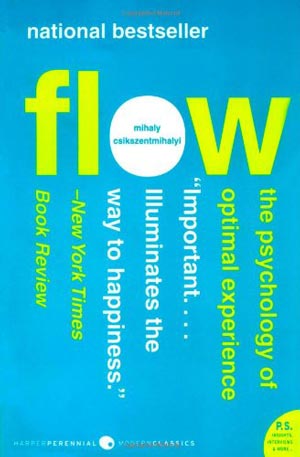How do I know when it has been a good training session? When I tell a client it is time for the foam roller and a look of surprise comes over her face.
That’s it? We’re done already?
It’s not that the workout was easy. Instead I like to think they have achieved a state of FLOW.
Perhaps you call it being “in the zone” or being focused. I like the term Flow better. Based on the research of psychologist and author, Mihaly Csikszentmihalyi, the definition of a flow experience is this:
…the mental state of operation in which a person performing an activity is fully immersed in a feeling of energized focus, full involvement, and enjoyment in the process of the activity. In essence, flow is characterized by complete absorption in what one does.
Flow appears to be something missing in many people’s lives. The modern workplace is lacking, being mostly a source of stress not contentment. We get lost in the minutiae of daily life outside of work, moving too fast to find the joy. Physical activity, however, can be the ONE place we can easily have a flow experience. Not only can we experience flow as part of a workout, it can help us achieve flow in other parts of our life as well. Csikzentmihalyi says in the book:
Everything the body can do is potentially enjoyable…If the functions of the body are left to atrophy, the quality of life becomes merely adequate, and for some even dismal. But if one takes control of what the body can do, and learn to impose order on physical sensations, entropy yields to a sense of enjoyable harmony in consciousness. (Flow, p 95)
The flow experience does not happen by accident. While there are some common traits among those who seem to live in a state of flow, the autotelic personality, the experience is open to anyone. Your workout, no matter if it’s running, lifting or boxing, can provide a great space to learn how to create flow in your life. Whether you are starting out on your journey or if you need to renew your motivation, finding FLOW can be extremely helpful. Here are the things, according to Csikzentmihalyi, that are needed for a flow experience.
- A challenging activity that requires skills.
If we are honest with ourselves we will admit a challenging workout is always a more rewarding one. Pick activities or an intensity that pushes you out of your comfort zone but has a high chance of success as well. Working to a place of complete failure or sickness is NOT the way to FLOW. - The merging of action and awareness.
This can be a big benefit of hiring a personal trainer. You, the client, just have to focus on the exercise. You let me, the trainer, think and tell you what to do next. Your work is focused but decisions about what to do next are left to someone else. You can do the same for yourself by making sure your workout is completely planned out before you start. All you have to do is follow the instructions you’ve written out for yourself. - Clear goals and feedback.
What is the goal of the workout? Having both a big picture goal (running a half marathon) and a smaller goal (I will run three miles) for each workout helps to create an important feeling of purpose. - Concentration on the aspect at hand.
You need a workout space were you can focus on the task and the goal of the workout. If you chat too much when you workout with a friend think about doing a solo workout or two each week. Wear your headphones in the gym to block out the “noise”. Try taking your workout outside if your home or the gym brings too many distractions. - The paradox of control.
You control the workout. The pace and effort are your own. This is a sense of control we often lack in jobs and relationships. Relish the time to be in charge. Connect with the muscle as you move it, being aware of the fact that YOU are initiating contraction. - The loss of self-consciousness.
Meaning you are not self-conscious about your actions. For a beginner this can be hard but you can make it easier by choosing a small and less crowded gym. Find out when the off peak times are and you might find you have the place to yourself. Participating in a group activity can also be helpful. Finding a class with people of a similar skill level and goals can make you more confident. Just remember most people are so involved in their own workout that they have little time to pay attention to anyone else. - The transformation of times.
Unless you’re doing interval training put away the timer. When you schedule time for workout, be realistic about how much you can spare so you don’t feel rushed. Try not to constantly watch the clock.
When we have success in one aspect of our life, we can often carry it over to other areas. By finding flow in your workouts not only are you more likely to stick with them but you are also more likely to experience flow in other areas of your life. For more tips and suggestions, check out FLOW: The Psychology of Optimal Experience by Mihaly Csikszentmihalyi.



